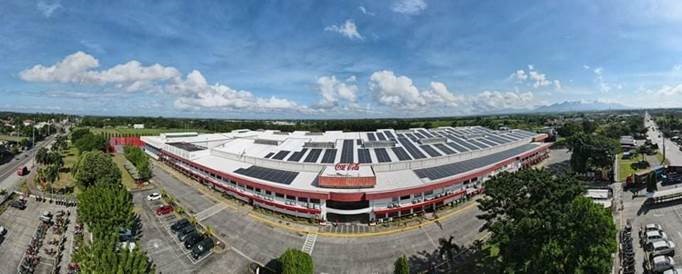The beverage giant Coca-Cola Philippines has completed 14,000 solar panel project in manufacturing sites and 24,000 solar panel project is underway.
Coca-Cola Beverages Philippines, Inc. (CCBPI), the bottling arm of Coca-Cola in the country, has achieved another sustainability milestone in Q1 of 2021 upon completing the installation of almost 14,000 solar panels in its Davao del Sur, Misamis Oriental, and Bacolod plants.
A multi-phased solar panel project is underway that covers four more sites— namely, Canlubang, Sta. Rosa, Zamboanga, and Cebu—with 2022 as a target deadline. With this, CCBPI is pursuing a 24,000 solar panel project, with the total capacity to produce a maximum of 9.4MW. More projects are in the pipeline— two plants in North Luzon and the Visayas are being assessed for renewable energy integration.

Energy efficiency is one of the company’s strategic investment areas. Efforts to further integrate renewable energy (RE) into its operations are part of CCBPI’s Cleaner Energy 2.0 initiative—a roadmap toward becoming a leader in clean energy use and energy use ratio in Southeast Asia by 2023. Even with the challenges brought by the pandemic, Coca-Cola steadily poured in investments—an initial $63M for 2021 and $95M in 2020—to ensure the highest standards of safety, quality, and sustainability for every bottle that reaches its customers.
To date, as much as 65% of Coca-Cola’s total energy consumption is sourced from renewable and clean energy, which are geothermal, solar, and biomass resources. The company’s two mega plants, Canlubang and Sta. Rosa, were the first to utilize RE in 2018. All of Coca-Cola’s manufacturing sites that are viable to be converted to 100% RE—given the existing grid and connectivity infrastructure—have been transitioned to use clean energy. These sites are Sta. Rosa, Canlubang, Ilocos, (Calasiao) Pangasinan, Cebu, San Fernando in Pampanga, and Meycauayan.
“Organizations of our scale need to consciously and deliberately manage our environmental impact. By placing sustainability at the core of our operations, we are able to demonstrate that growing a successful business through sound and responsible enterprise strategies is highly achievable.” says Gareth McGeown, President and CEO of Coca-Cola Beverages Philippines, Inc. “We are increasing the volume of our production and maintaining the quality of our beverages, hand-in-hand with hitting our sustainability goals.”
Consuming less energy, producing more beverages
Coca-Cola has been delivering significantly on reducing overall energy consumption. To track progress on this front, the Company uses a metric called Energy Use Ratio (EUR), which is the amount of energy used for every liter of product produced.
The suite of energy savings initiatives has so far improved Coca-Cola’s energy use ratio from 2014 to 2018 by as much as 30%, which means that Coca-Cola is utilizing less power even as it produces more beverages—but it is not stopping there.

CCBPI has introduced more operational excellence programs, which include step change in processes through initiatives like “LUPIT” (Level-Up Process Improvement Teams) that are fueled by a rewards and recognition scheme. LUPIT, a Filipino word for awesome, is run through a combination of focused improvement teams and individual employee improvement ideas and suggestions.
“Our 20 plants across the Philippines are equipped with state-of-the-art technologies that allow for efficient energy and water consumption. We make sure that we continuously innovate and upgrade our processes, train our people, and invest in technology to ensure that the systems we have in place demonstrate our commitment to sustainability—it’s not all talk,” adds McGeown.
Sustainability across the value chain: water, packaging, fleet operations
Comprehensive strategies are in place to further improve the company’s operational efficiencies throughout the value chain— from using biomass boilers that are fed rice hulls as fuel, to upgrading the fleet to Euro IV-V compliant trucks; from improving systems in manufacturing, to replacing old refrigeration equipment to new units that utilize LED lighting and hydrocarbon refrigerant.
In line with World Without Waste—which is Coca-Cola’s global goal to collect and recycle every single bottle and can by 2030—CCBPI partnered with Indorama Ventures, a global leader in green technology, to construct PETValue Philippines, a PHP 1-billion PET recycling facility in General Trias, Cavite. The DTI’s Board of Investment (BOI) granted the plant a ‘pioneer status’ as its technology is the first of its kind in the country.
PET recycling is also being addressed at the source: as colored bottles chart low in recyclability, Coca-Cola changed the iconic Sprite green packaging to clear PET in 2019, in order to increase its recyclability.
Furthermore, water savings initiatives and operational efficiencies in the manufacturing sites, as well as community programs like AGOS also enabled Coca-Cola to achieve an estimated 132% water replenishment.
“Energy conservation, water replenishment, and taking responsibility for our packaging footprint—these are the sustainability commitments that we are tirelessly and strategically working on,” says McGeown. “We are proud of what we have achieved thus far, but we are just getting started.”
McGeown adds, “Coca-Cola has been in the Philippines for 109 years now, but we believe that our best days are still ahead of us. There is a lot more we can do as a company: More partnerships we can forge, more innovations to introduce, and more lives to help change for the better.”